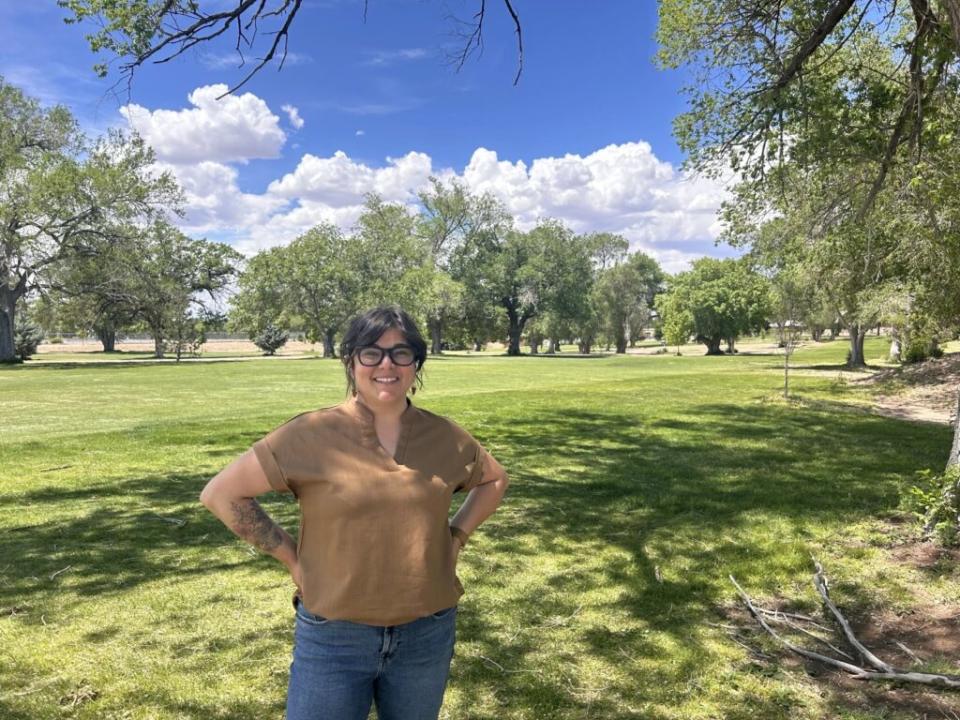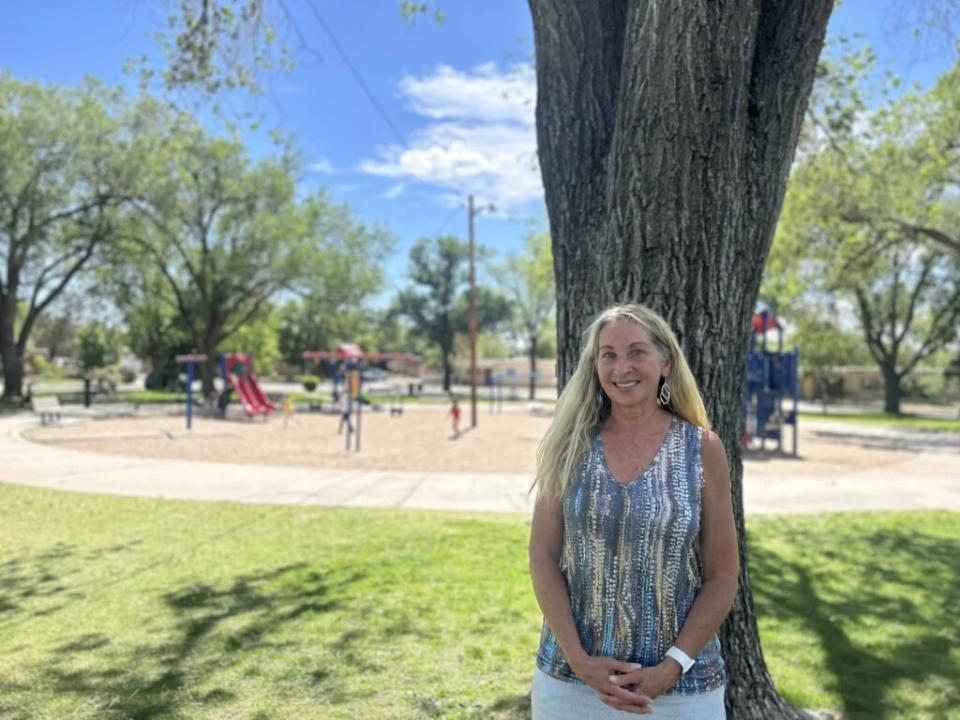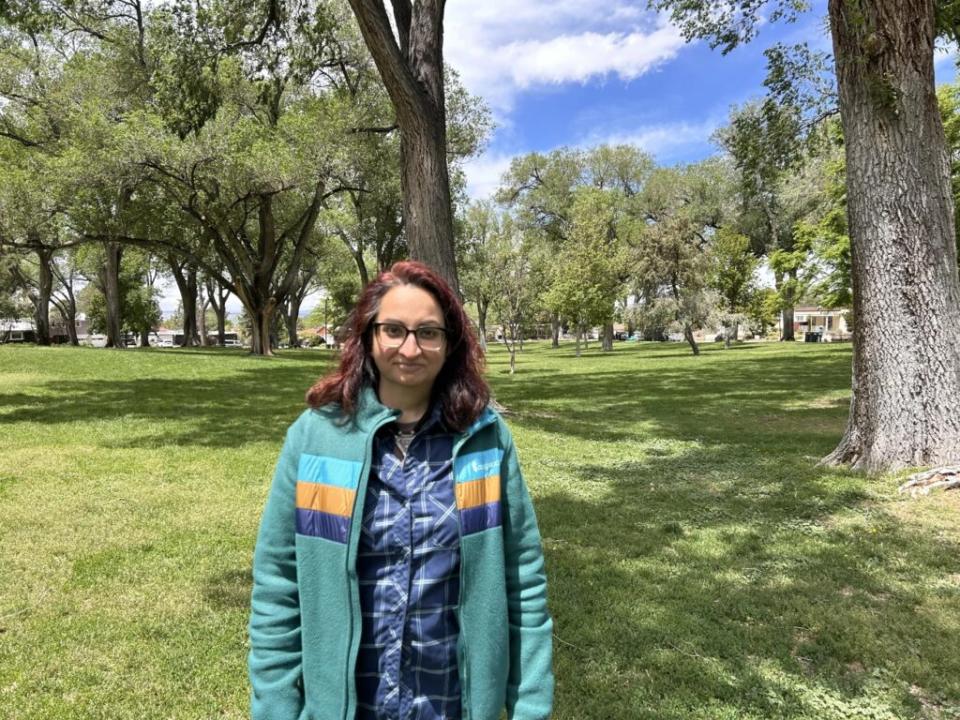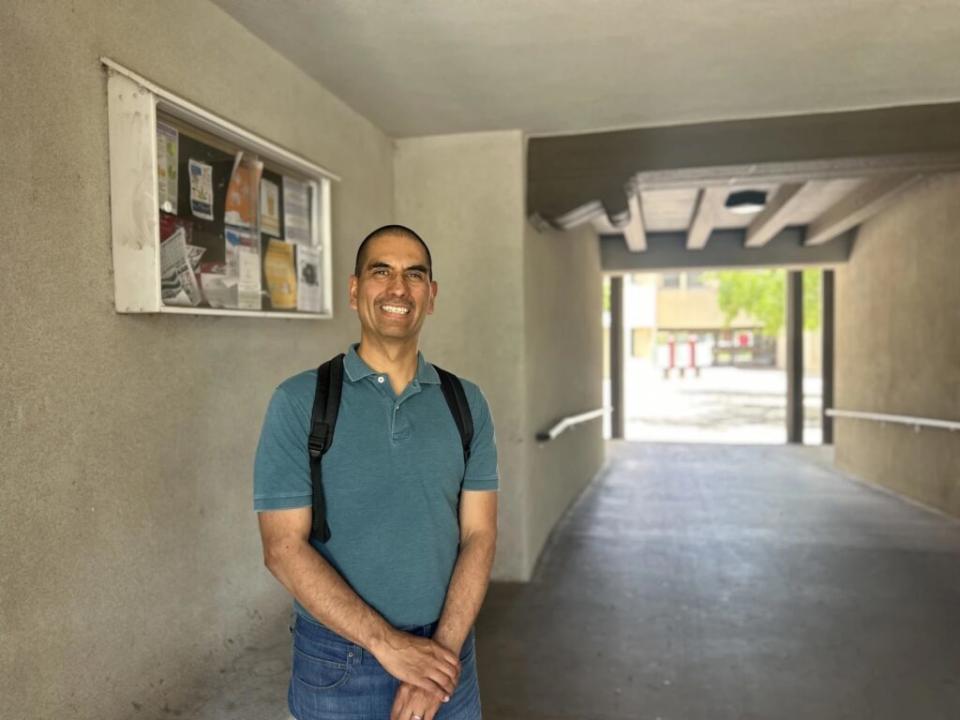Four progressives vie to replace the longest-serving NM state rep

- Oops!Something went wrong.Please try again later.
The red line pulls up to an Albuquerque Rapid Transit stop in Nob Hill. The city bus stop is on the eastern side of the New Mexico Senate District 18, a seat that will be represented by a new person for the first time in 27 years. (Photo by Shaun Griswold / Source NM)
After 27 years in the state House, New Mexico Rep. Gail Chasey (D-Albuquerque) is retiring, and four Democratic candidates are vying for her Nob Hill-area District 18 seat in the primary election.
All four say they’re big fans of Chasey and much of the legislation the Majority Floor Leader has championed. With the four progressives sharing similar political ideals, their varied backgrounds have emerged as a focal point of the campaign.
Marianna Anaya is a community organizer and registered lobbyist, the latter of which can get a bad rap. But she doesn’t see what she referred to as “the big L word” that way.
“I usually answer questions about L words in terms of me being a lesbian, but right now I’m answering them about me being a lobbyist,” she said. “I really have no shame in the work that I’ve done.”
Outgoing Rep. Chasey has endorsed Anaya, saying what’s important is what she lobbies for. Anaya worked to repeal New Mexico’s dormant abortion ban before Roe v. Wade was overturned and increase access to the ballot through the New Mexico Voting Rights Act among other progressive policies.
In her endorsement, Chasey also called Anaya “the exception” as a candidate with lived experience.
“I fight for our public schools because I went to our public schools,” Anaya told KUNM. “And I fight for homelessness and housing issues because my family has struggled with homelessness.”
Anaya identifies as a queer Chicana and was raised in Albuquerque’s North Valley by her mother, grandmother and eight aunts. She was also the first in her family to go to college, receiving a Bachelor’s degree at the University of Texas at Austin.
“What that meant for me is that I was helping my family navigate all of these different barriers that we were facing,” she said. “Whether it meant struggling with substance abuse, or struggling with trying to get medical care, or the mass incarcerations system or CYFD [Children, Youth and Families Department].”
Anaya said those experiences position her well to advocate for district residents and further her policy priorities of addressing homelessness, housing and poverty.
The race’s other candidates, including Gloria Doherty, push back against Chasey’s characterization of Anaya.
“You can’t dismiss other people’s lived experiences,” Doherty told KUNM. “I grew up in poverty, both of my parents died from social inequities and health care disparities, and I had to work five jobs to get my way through school. [I am a] single mother, raising my kids.”
Doherty said her perspective has been further broadened working as a nurse practitioner at Sandoval Regional Medical Center.
“I am exposed to thousands of lives who express what their frustrations are, what their needs are, why they arrived because of not being able to get access,” she said.
She also holds a Doctoral degree in Public Policy and Public Administration. Health care and education reform top her list of priorities.
“I’m able to analyze policy, and do analyze policy, and have for over 20 years,” she said. “I’ve developed policies both at the local and state levels.”
Candidate Dr. Anjali Taneja, a family physician, also has a background in medicine and pushing for health care policies.
She takes issue with the idea that Anaya, who conducts work in the Roundhouse, is the only candidate who could get things done if elected.
“That feels very exclusive to me because that means that those of us on the ground fighting shoulder to shoulder with community members don’t have the ability to have access,” she said. “And it creates an echo chamber of sorts — that only people who are already in the Roundhouse are the ones who get to represent us.”
As the executive director of the nonprofit clinic Casa de Salud, Taneja works with people who traditionally struggle to access care — those experiencing poverty and homelessness, coming out of incarceration, or navigating the immigration system.
“I am an advocate for people with lived experience,” she said. “And I think that that vision, that knowledge, that fuel, that level of expertise, and what I get to bear witness to, is incredibly valuable.”
She added she comes with her own life experience of another kind, as a queer daughter of immigrants from India.
State politics are also not unfamiliar territory for the candidate.
“I’ve been appointed to the primary care council, I’ve been appointed to the governor’s council for racial justice, and I’ve helped introduce and helped pass over six bills,” she said.
Those include expanding access to opioid addiction treatment in prisons and jails and protecting consumers from surprise medical bills.
There are currently no doctors serving in the New Mexico House. Taneja said it is important that changes, particularly because health care policy takes up a lot of room in the budget and lawmakers are unpaid and lack staff.
“They might not be able to have the education needed on specific health care issues that would be important in setting policy,” she said.
Taneja has the endorsement of the area’s state Senators Antoinette Sedillo Lopez and Gerald Ortiz y Pino.
Juan Larrañaga identifies as a Chicano and grew up in poverty in Albuquerque, attending public school. He credits mentorship programs for his attending Occidental College, a liberal arts school in California, and then UNM business school. He has worked in higher education most of his career, primarily in IT support.
“I consider myself a scholar, advocate, and parent of color,” he told KUNM.
As a board member for Libros for Kids and ABQ Read to Me, early literacy and education are central to his platform.
On his website, he says he promotes “parents’ rights” in schools, a term that has become synonymous with a conservative movement furthered by groups like Moms for Liberty that promote anti-LGBTQ policies and book banning in schools. Larrañaga said that’s not how he uses the term.
“Parent’s rights for me is more ‘let’s support parents.’ Parents want the best for their children and sometimes they don’t know how to get that extra tutoring or how to support their child,” he said. “My child is profoundly deaf in one ear. What rights do I have as a parent to support her? What rights does she have in the classroom?”
He said the four candidates in the race are closely aligned politically, but he hopes to distinguish himself.
“I definitely see myself as very similar, but also see myself as different,” he said. “I see myself as a family voice, a different voice in my background working with stakeholders and my passions of literacy and renewable energy.”
Larrañaga has brought in the least money in the campaign, with $2,530 in contributions, according to the Secretary of State’s Office. Records show Anaya has raised the most, at $119,764, followed by Taneja with $92,912 in contributions. Doherty has gotten $49,811 in the door so far. A final campaign finance disclosure is due on May 30.
No Republicans are running for the deeply blue District 18 seat. Early voting ends June 1 ahead of Primary Election Day on June 4.
The post Four progressives vie to replace the longest-serving NM state rep appeared first on Source New Mexico.





